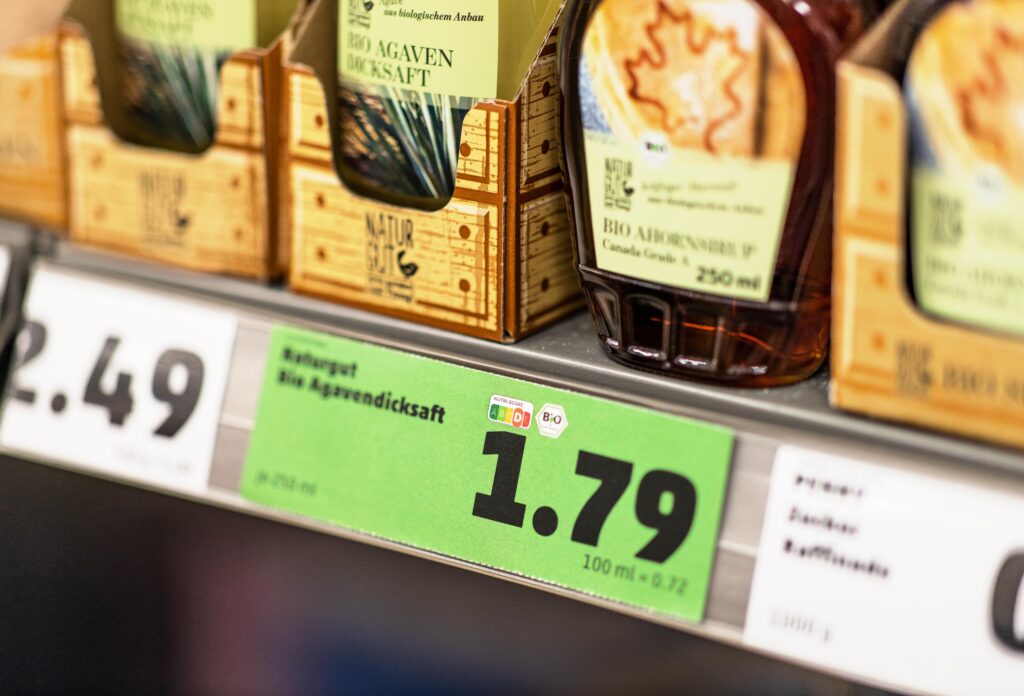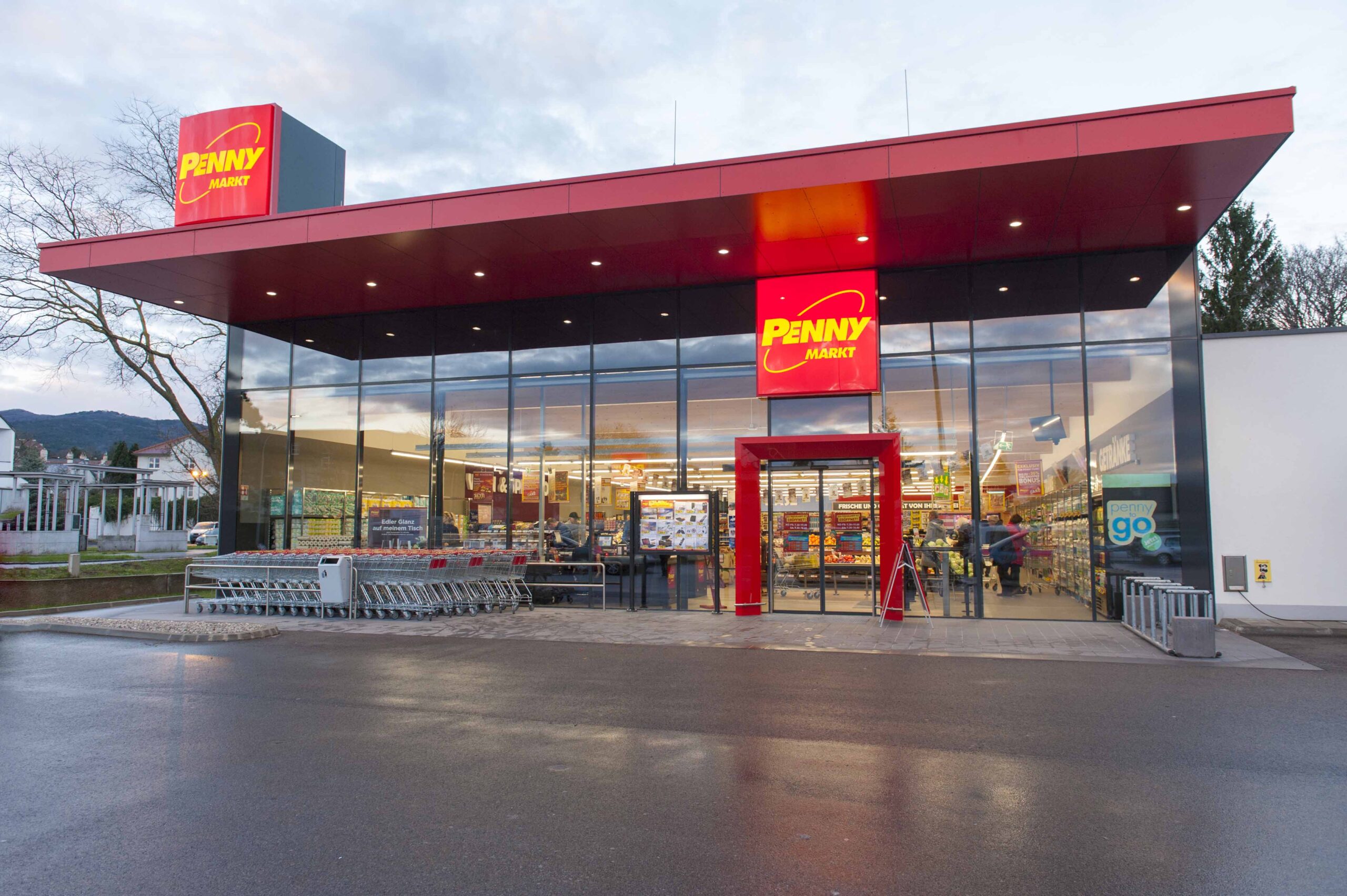Would You Pay For Meat & Dairy’s True Cost? German Supermarket Tests Climate-Inclusive Pricing
5 Mins Read
In a weeklong trial, German discount retailer Penny has increased the prices of nine products – mostly dairy and meat – to reflect their true cost on the climate (including soil and water use) and human health. Implemented across its 2,150 branches, the experiment spotlights carbon labelling in a novel way, and follows a 2020 study by the supermarket that showed the price of meat and dairy would be far higher when factoring in the true environmental cost of the food supply chain.
Three years after the research, which coincided with the launch of Penny’s first sustainability-focused store, the trial (dubbed Wahren Kosten in German) covers nine food products. The retailer collaborated with experts Professor Tobias Gaugler and Dr Amelie Michalke from the Nuremberg Institute of Technology and the University of Greifswald, following the belief that supermarket prices don’t reflect the true climate and health costs of food production.
The campaign sees the markups of items like Maasdamer cheese go up by 94% to €4.84, Weiner sausages by 88% (from €3.19 to €6.01), mozzarella by 74% to €1.55, and fruit yoghurt by 31% (from €1.19 to €1.56). As an example, the Maasdamer price hike included the cost of emissions from methane and carbon, soil damage due to intensive farming and animal feed production, pesticide use (and its effect on farmers’ health), and groundwater pollution through fertiliser use.
In contrast, vegan schnitzels only witness a 5% increase in prices. This reflects the gap between the climate costs of conventional meat and plant-based alternatives – a Nature Food study last month revealed that vegan diets contribute to 75% less climate-heating emissions, water pollution and land use than meat-rich ones.
Professor Gaugler said that the data collected from the campaign can offer “valuable insights into buying behaviour”.
Building on previous true cost research
Penny’s awareness week reflects its findings from its 2020 research – carried out in partnership with the University of Augsburg – which found that minced meat should cost thrice as much as the retail markup and cow’s milk should be double the price. It led to the opening of Penny Grüner Weg, the company’s first sustainability store, where food labels included these climate costs. Consumers don’t pay the surcharge, but they serve as a key awareness tool.
Separate research by the University of Augsburg found that the differences between climate-induced price hikes in plant-based, dairy and animal-based products were stark. For example, while fruits and vegetables would carry a 25% markup, meat and dairy would be 146% and 91% more expensive, respectively. Additionally, organic production methods lead to far fewer emissions than conventional farming across meat (71% fewer), dairy (40%) and plant-based (57%) foods.
The campaign hopes to shed light on the differences between these food groups. A Newsweek study published in May found that more Americans (40%) believe eating less red meat would not lower carbon emissions than those who feel it does (34%). This school of thought is exacerbated by the fact that 93% of climate change coverage doesn’t mention animal agriculture, as reported by Sentient Media and Faunalytics.

The rise of carbon labelling and discourse on meat taxes
Penny’s trial is a more blatant form of carbon labelling, a practice increasingly being adopted by companies globally as they strive to reach their climate targets and provide transparency to consumers. But Penny isn’t the first retailer to introduce climate costs to its products – in 2020, Swedish food brand Felix unveiled The Climate Store, a pop-up grocery store that listed the carbon footprint of items as their markup.
In April, Dutch supermarket Albert Heijn began a trial in three of its To Go stores, allowing shoppers to pay either the normal price or the one reflecting the true cost of food production. Black coffee went up from €2 to €2.08, while coffee with milk increased by 36 cents, compared to an 11-cent hike for coffee with oat milk.
Likewise, UMass Amherst became the first US university to incorporate carbon footprint information on its cafeteria menus earlier this year. And in 2020, Just Salad became the country’s first restaurant chain to introduce carbon labels across its entire menu. Such labels also transcend the food space – British footwear bread Humans Are Vain also added carbon footprint information on all its products in 2021.
Carbon labelling has become so mainstream that there are dedicated businesses providing tools for companies to calculate their climate impact. British start-up My Emissions and Sweden’s Klimato both offer services to help brands and restaurants calculate the environmental impact of their offerings.
This is in line with consumer sentiments on carbon labelling. In 2021, research by UK company 3 Sided Cube revealed that 64% of Brits would back legislation making carbon footprint information mandatory on product labels. The practice’s popularity is further reflected by a survey showing that Europeans consider climate change the most serious problem facing the world.
Meanwhile, several initiatives are looking into the impact of value-added taxes on food prices. The meat and dairy sectors get tax cuts and government subsidies to keep their prices down, but the EU Commission last year approved a European Citizens’ Initiative calling for these subsidies to instead be passed on to the alt-protein industry.
Organisations like the True Animal Protein Price Coalition are lobbying governments to increase the VAT on meat to offset the tax on fresh produce. In 2019, politicians from Germany’s Social Democrats and The Greens proposed raising the VAT on meat to 19%. And in 2021, a survey covering Germany, France and the Netherlands showed that 70% of consumers would support an environmental tax on meat.




